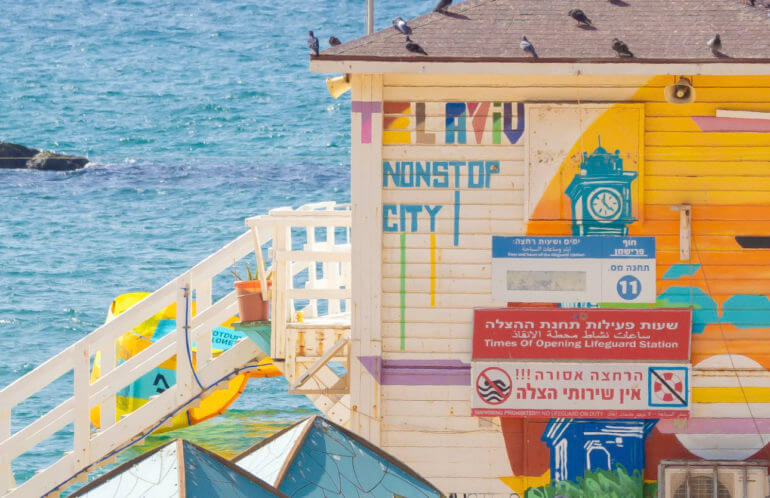
Should I Make Aliyah? A Nefesh B’Nefesh Representative Advises
Florida, North Carolina, New York, Georgia…each day it seems like a different state is reporting antisemitism— numbers are increasing rapidly. We just marked Yom HaShoah — Holocaust Remembrance Day — a time devoted to ensuring a terror even remotely in that realm doesn’t happen again.
With stories percolating that feel eerie, much like pre-Holocaust times, the possibility that it could occur again isn’t as far out of reach as it once was. Could America be next? Will we be safe here?
I sat down with Marc Rosenberg, Vice President of Diaspora Partnerships for Nefesh B’Nefesh to speak about Aliyah as a real possibility. The organization exists in order to make the process of moving to Israel as seamless as possible. Rosenberg actually moved 21 years ago from America — right before Nefesh B’Nefesh started. In this conversation, we spoke about everything related to the big decision of moving across the world — how to go about doing so, the pros of doing so now versus waiting, the benefits one receives once there and more.
Cause and Effect
The truth is, Rosenberg explains, not many people are actually making Aliyah due to the fears listed above. Yes, they get calls and emails with some cases of that, but it’s not the majority.
The biggest uptick Nefesh B’Nefesh received in those making Aliyah was during Covid. The main reason so many people made Aliyah then was due to remote work opportunities. The organization experienced a 40% increase in Aliyah interest and those moving but that number has since slowed. On average, about 4000 people make Aliyah every year.
Making Aliyah may include a spiritual high but also results in a lot of change — you’re going to a Jewish state but also a foreign country. For many, that involves a new language, being far from family and friends, new school systems, potentially changing jobs or career paths, a new healthcare system and more.
“There’s a difference between the rhetoric people are having at the Shabbat table and on social media and the real life people are experiencing in Israel,” Rosenberg shares. “A lot of times people are using Israel as this safe haven, but people making Aliyah are not running away. They feel they are going to a place that’s better.”
It’s an important distinction.
The truth is, while Israel — especially at the moment — also has very real incidents of terrorism and antisemitism as a result of the Israel-Palestinian conflict, Rosenberg says that Israelis feel very safe in the country.
“There’s a different feeling of safety because 80% of the country is Jewish. It’s not just Hatzolah that can come to you in an emergency, the country’s first responders are mainly Jewish. There is a network of police officers outside your synagogue. The people who choose to make Aliyah feel that this is their home and want people to feel at home in Israel.”
What is Home?
“Can you have more than one home?” Rosenberg proposes. “I think so. Some people have a house on the Jersey shore as a second home. While others feel that it’s a black and white thing, there are many ways to look at it.”
There are different kinds of Zionism, Rosenberg continues. Some people view it as having a place to go when they really need it. Others want to be there now to build, while other people are mainly focusing on where they are and being a light in the darkness.
The fact remains, it’s a difficult decision. Yes, for some, it’s a no-brainer to move, but for others, especially those who would be uprooting families, becoming Israeli isn’t so simple.
“Very few people can do their job in Israel,” Rosenberg explains. “You are immigrating. Hebrew is the main language here. Amazon prime doesn’t deliver.”
That all being said, Nefesh B’Nefesh is there to help and provides many benefits to make the transition easier. Those benefits include: a free flight, free healthcare regardless of any pre-existing conditions for the first year, a tax break when you get a job, a cash gift that gets paid over the first six months to help with expenses (which comes out to almost $4000 a person), a free BA under the age of 27 or a free MA under the age of 30, discounts on purchasing items like a home or a car and a 10-year tax holiday on passive income and a free five-month intensive Ulpan (Hebrew learning program).
You can also bring three lifts, or shipping containers, to Israel. You have to pay for shipping but they waive the tax on them.
Nefesh B’Nefesh continues to help people even years after they’ve made the move with things like updating a driver’s license, switching schools for their kids, figuring out the Hebrew on something, moving towns, etc. “We helped a family who moved when their oldest was nine, and then nine years later the kid was drafting into the army and we helped explain that process to them,” Rosenberg shares. “People need that guidance.”
Start with a Single Step
If you’re interested in making Aliyah or just want to learn more about it, Rosenberg encourages those to just take one step forward. Email or call Nefesh B’Nefesh to learn more about how the process might work in your particular situation.
You can’t officially make Aliyah now if you don’t intend to live there — you have to reside there at least part of the time in order to get approved by the government. That being said, if you’re on the fence, he suggests building a “Moshiach suitcase.” You can do the work to get all of your documents in order so when the time comes, you eliminate a huge part of the Aliyah process and are good to go. You need birth certificates for every family member, letters from Rabbis, your marriage certificate, and all names need to match on all the documents because the Israeli government is attuned to every detail to ward against identity theft.
Rosenberg explains doing all of that ahead of time will get rid of months of prep time when making Aliyah as a family. He suggests starting to collect info from others who are living there — what are realistic job opportunities, what community might I live in — speak to those in different areas to learn more. You’ll get a stronger perspective.
“People think that those who make Aliyah are heroes — that you have to be like Avraham Avinu to do it,” he says. “But [olim] are just regular people. They make a heroic decision — it’s certainly a huge one — but they’re people just like anyone else. It’s the greatest choice I’ve made.”
If you found this content meaningful and want to help further our mission through our Keter, Makom, and Tikun branches, please consider becoming a Change Maker today.







